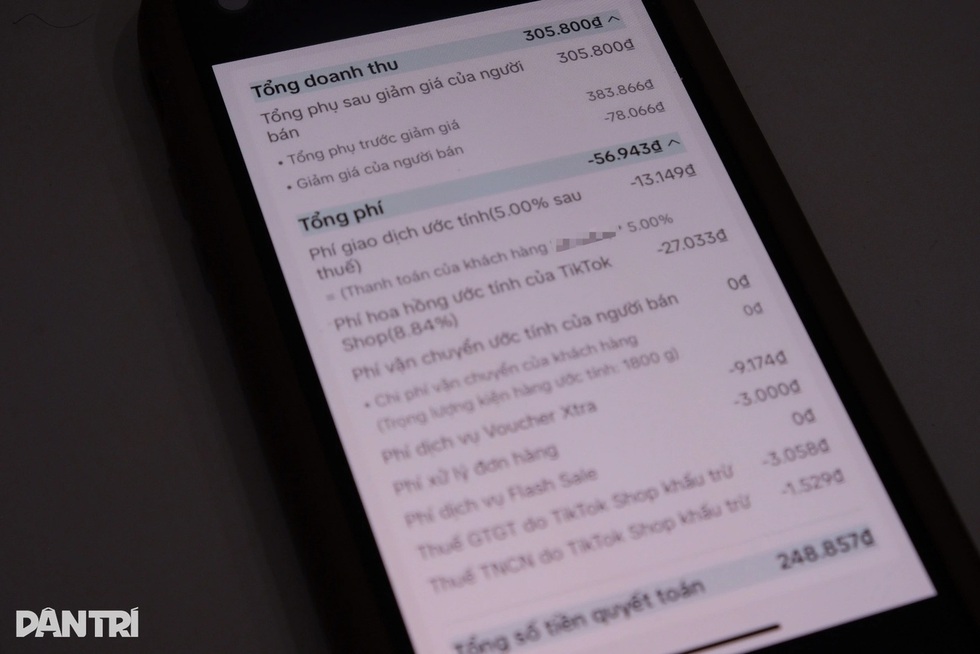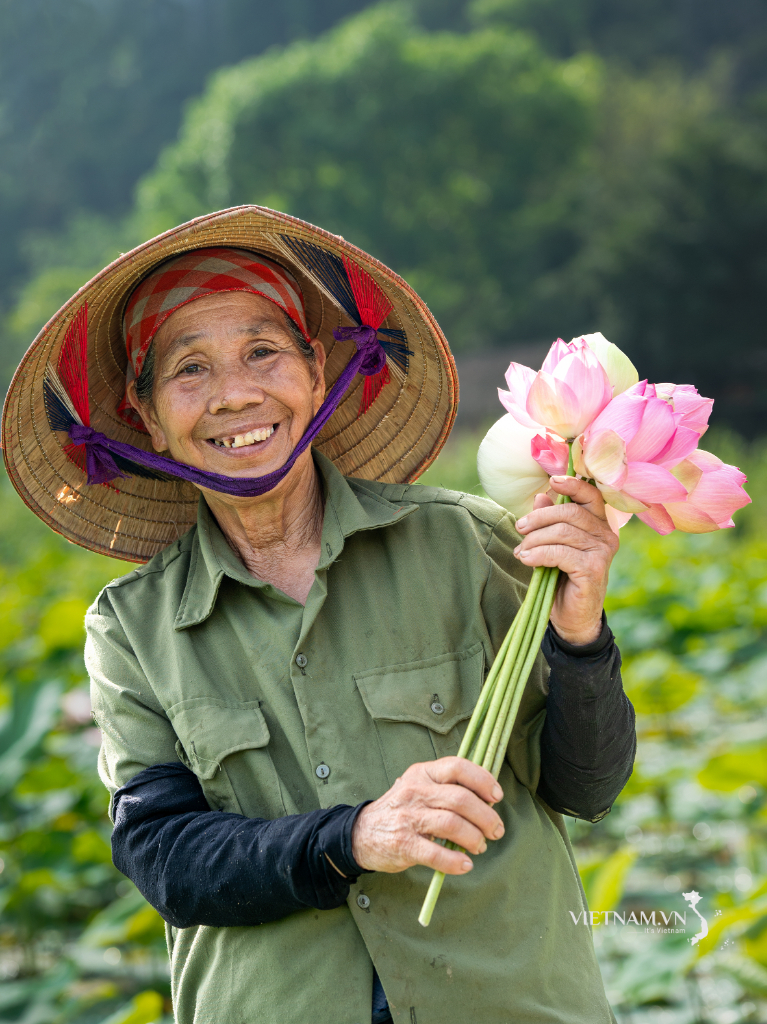Ms. Dao Thi Hoa, 51 years old, living in the mountainous commune of Huong Son ( Ha Tinh ), used to only go to the market when she needed to shop. However, for more than a year now, she has become a "fan" of online shopping.
“I watch livestreams selling products, hunt for discount codes, and then place orders. Now I can buy everything just by sitting at home, and the prices are cheaper than in the market. I usually read reviews first, and if I see something reputable, I click to buy. If I don’t like it, I can return it,” said Ms. Hoa.
From a time when the concept of “online shopping” was still unfamiliar, Vietnamese e-commerce has come a long way in more than a decade – from a few small experimental platforms to a vibrant market worth 25 billion USD. Online shopping is no longer a habit of urban youth alone. The online “wave” has spread to rural and mountainous areas, where people like Ms. Hoa are also proficient in hunting for sales, watching livestreams and placing orders just like city dwellers.
Fierce promotional war and new race of the "big guys"
After more than a decade of development, Vietnam's e-commerce has gone through a boom period with dozens of trading floors being established and then quickly leaving the game. Now, the market is entering a period of strong restructuring, where only names with enough potential remain. Once-famous platforms such as Sendo, Voso, Vat Gia or Cho Dien Tu gradually become obscure, giving way to the fierce race of domestic and foreign "giants".
To date, the e-commerce market revolves around 4 "giants": Shopee, TikTok Shop, Lazada and Tiki. According to data from the e-commerce data platform Metric, by the end of the third quarter of 2025, Shopee is leading with 56% market share, TikTok Shop, although only joined in 2022, has witnessed impressive continuous growth, up to 41% market share. Meanwhile, Lazada maintains a stable market share of 3%, while Tiki is increasingly narrowing its operations, with its market share falling below 1%.
The e-commerce race in Vietnam is increasingly fierce. Only platforms with strong financial potential, flexible promotion strategies and effective user retention can survive.
To attract consumers, the platforms continuously launch a series of deep discount programs, especially on double days such as 1/1, 2/2, 3/3... or Black Friday, Online Friday. Many items are discounted from 50-90%, along with incentives such as "free shipping", "coin refund", "same price products" or "buy 1 get 1 free".
One of the prominent directions of the platforms is to invest heavily in content and entertainment shopping experiences (livestream, short videos ). In particular, livestream sales become the main tool, where buyers can watch, interact, and hunt for promotions directly.
Big names like TikTok Shop and Shopee also spare no expense in sponsoring and cooperating with many KOLs (influencers), KOCs (influencers) and celebrities to serve grand music festivals, livestreams and interactive games... to attract buyers' attention.

"Giant" Shopee spends a lot of money on the shopping and entertainment model (Photo: Shopee).
Along with that, the platforms are investing heavily in logistics systems and service experiences. Platforms focus on developing warehouse networks, goods sorting centers and their own delivery teams.
The competition between e-commerce platforms is not only about “discounts” but is spreading to a comprehensive race in technology, infrastructure and user experience. For example, SPX Express - Shopee's logistics unit - has planned to develop a 17-hectare goods sorting center in Hung Yen .
Lazada has focused its investment on the logistics system from 2022-2023. In March 2023, this "giant" put into operation a goods sorting warehouse with a total area of nearly 20,000m2 in Song Than Industrial Park (HCMC). Previously, Lazada also owned sorting centers in HCMC and Hanoi, along with many warehouses for storing and processing goods.
Buyers benefit, sellers are under pressure
E-commerce is growing, the competition between platforms is getting fiercer, the biggest beneficiaries are the customers. Diverse goods, cheap prices, faster delivery and many accompanying services. Buyers will also have the right to consider prices, promotions, service quality, and product quality.
Shopping on e-commerce platforms is now not only a need, but also a form of entertainment, as the trend of “shopping entertainment” (a combination of shopping and entertainment) is increasingly popular. Users can participate in activities such as livestreaming, watching product review videos and interacting directly with sellers.
Ms. Nguyen Hoa (Hanoi) often waits for double days like September 9, November 11 or December 12 to watch livestreams, both to see detailed product reviews and to hunt for good prices and free shipping codes. "Double days are a golden opportunity to buy cosmetics and household appliances on sale from famous KOLs, and to close many deals with deep discounts from brands," she said.
However, consumers are not always the beneficiaries. The psychology of hunting for promotions, favoring cheap goods and trusting KOLs, KOCs or celebrities often causes consumers to fall into the “trap” of fake, counterfeit and poor quality goods.

All products of the Hai Sen Family TikTok channel have been hidden from the shopping cart on the e-commerce platform after the channel owner was arrested for being involved in selling counterfeit goods (Photo: Screenshot).
A typical case is Quang Linh Vlogs and Hang Du Muc - two characters once considered "livestream warriors" with millions of followers were prosecuted by the authorities for deceiving customers. The Kera vegetable candy product they advertised as being able to "replace green vegetables in meals" actually had a quality inspection far inferior to what was introduced on the livestream.
Or the case of the owner of the TikTok channel "Gia Dinh Hai Sen" being prosecuted and detained to investigate the crime of Trading in counterfeit goods caused a stir in public opinion. In particular, the product "Hai Be delicious syrup" was identified as fake, widely sold through many e-commerce platforms such as TikTok Shop, Shopee, Facebook. According to the authorities, more than 100,000 boxes of "Hai Be delicious syrup" were sold on the market, mainly through livestreams and on-line booths.
While consumers are enjoying more and more incentives, sellers are facing increasing pressure as e-commerce platforms continuously adjust their fee schedules and operating costs continue to escalate. Most recently, TikTok Shop has charged additional fees to sellers, specifically an “order processing fee” of VND 3,000/order applied to all order values and quantity of items in the order.
In early July, Shopee also applied an infrastructure fee of VND 3,000/order to continue upgrading and developing infrastructure, technology and improving the shopping experience for both buyers and sellers.
According to sellers, the new fee seems small, but with hundreds of orders per day, the total fee increases significantly, making it even harder for small sellers to compete. Not to mention, the support and order processing from the platform is already slow and superficial, now the additional fee makes them even more "frustrated".
A shop owner on TikTok Shop added that an order of more than 300,000 VND costs more than 50,000 VND in fees such as the floor's commission fee, voucher service fee, order processing fee, VAT, and personal income tax.

Total cost of an order on TikTok Shop from October 27 (Photo: Minh Huyen).
"The floor fee is sky-high, sellers have to constantly adjust their selling prices to cover the floor fee, but as soon as the price increases, customers stop buying, and the goods become unsaleable. There are industries where the commission fee is up to 14-15%, not including advertising and shipping, so sellers are increasingly discouraged," this shop owner complained.
Many shop owners admit that the pressure of platform fees combined with operating costs has forced them to seriously consider maintaining their business on these platforms. Others said they have stopped doing business on the platform and switched to other platforms such as Facebook and Instagram.
According to Metric data, by the end of the third quarter, there were only about 566,500 shops remaining in operation, meaning more than 51,000 stores had left the market in the first 9 months of the year.
From the price race to the journey of sustainable development
After a period of rapid growth with price reductions, promotions and “money burning” to gain market share, Vietnamese e-commerce is entering a more sustainable development phase. Platforms are gradually shifting to improving the quality of goods, services and user experience, instead of just competing on low prices.
Mr. Nguyen Huu Tuan, Director of the Center for E-commerce and Digital Technology Development (Department of E-commerce and Digital Economy - Ministry of Industry and Trade), said that if in 2014 the scale of Vietnam's e-commerce only reached a few hundred million USD, then by 2024 this figure had reached 25 billion USD. With a growth rate of about 25.5%/year, it is expected that by 2025, Vietnam's e-commerce could exceed 30 billion USD.
Mr. Tuan emphasized that after 10 years of strong growth, in the coming period, Vietnamese e-commerce will shift to sustainable development, focusing on quality, infrastructure and consumer trust.
"At the same time, connect domestic e-commerce with online export activities. In the coming years, in addition to domestic development, the Ministry of Industry and Trade will also promote online export activities," he said.

Many famous people participate in livestream sales (Photo: Screenshot).
Mr. Tran Van Trong - General Secretary of the Vietnam E-commerce Association (VECOM) - said that to have a safe and sustainable online shopping environment, there needs to be coordination between state management agencies, businesses and consumers.
Accordingly, he said that management agencies need to issue policies to support businesses in applying technology, while also perfecting a transparent legal corridor to ensure a balance of interests between sellers and buyers.
Online businesses need to determine a long-term strategy, especially businesses must balance short-term costs and long-term, sustainable benefits to build a reputable brand in the online environment. Online business has many opportunities but also many challenges and competition.
On the consumer side, Mr. Trong said that buyers need to "choose correctly", prioritizing reputable e-commerce platforms, genuine stores, and reliable sellers; at the same time "choose enough" for their needs and budget, avoiding the mentality of buying cheap at all costs.
"In addition, consumers need to raise awareness of protecting personal information, be vigilant against online fraud and choose safe payment methods. Only when all three parties act responsibly can the Vietnamese e-commerce market truly be safe, transparent and develop sustainably," he emphasized.
Source: https://dantri.com.vn/kinh-doanh/cuoc-dua-khoc-liet-cua-cac-ong-lon-thuong-mai-dien-tu-ai-duoc-ai-mat-20251106002125615.htm





![[Photo] Cutting hills to make way for people to travel on route 14E that suffered landslides](https://vphoto.vietnam.vn/thumb/1200x675/vietnam/resource/IMAGE/2025/11/08/1762599969318_ndo_br_thiet-ke-chua-co-ten-2025-11-08t154639923-png.webp)

































![[Video] Hue Monuments reopen to welcome visitors](https://vphoto.vietnam.vn/thumb/402x226/vietnam/resource/IMAGE/2025/11/05/1762301089171_dung01-05-43-09still013-jpg.webp)

































































Comment (0)